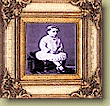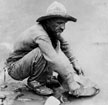

The Rebellion at Hill's Bar
An Episode of the Fraser River Gold Excitement
by F.W. Howay. New Wesminster, B.C.
IN the spring of 1858 rumors of the discovery of gold in the Fraser River drew to the wilds of New Caledonia, as the country was then called, great numbers of the adventurous and discontented of California and Oregon. Never in the migration of man has been seen an immigration as sudden and so vast. As the argonauts desecended the river, they prospected the various bars for gold. These bars are sandy flats, occurring in the river bends. For ages the river rushing madly through the mountains tore away masses of rock and gravel and crushed them in its natural arrastre, depositing the gold with its accompanying metallic sand in the eddies in the bends, and diligently covering it with worthless debris.
The first bar which gave satisfactory promise to men who had washed the rich gravel of the Yuba and the Stanislaus was that known an Hill's Bar. It was about five hundred yards in length and was situated on the left bank of the Fraser about two or three miles below Fort Yale.
On Christmas Day in 1858 - the first Christmas Day in British Columbia - a miner named Farrell, who had been working on Hill's Bar, determined to pay a visit to Yale. At that time, Hill's Bar was famed in the Colony as the richest and 14 toughest " bar on the Fraser. Its population consisted chiefly of refugees from the rough justice of the San Francisco Vigilance Committee. Farrell, like many of his neighbours on the bar, had had a successful season, and now sought this opportunity of celebrating his success. An usual, the celebration consisted in visiting in turn each saloon in Yale, and indulging in a large number of "John Collin's" and various other mixtures of liquors. In a short time he had drunk enough to be in a fighting humour. Then he began to look around for trouble. While engaged in this pleasant occupation, he chanced to notice a negro, Dickson, standing at the door of his barber shop. In his condition, Farrell regarded it as an outrage that a negro should dare to breathe the same air as a free and independent American citizen.
He therefore demanded from the negro an explanation of his conduct, pointed out to him the grievous wrong he was committing, and, to enforce his precepts in an unmistakable manner, he proceeded vi et armis to make an impression on him with the butt of his revolver. He then went his way to sleep off the effects of his debauch.
In due time news of the brutal and unjustifiable assault reached Hill's Bar. Now Hill's Bar boasted a magistrate, one George Perrier, who, but a short time before, had been appointed a Justice of the Peace. So far as can be ascertained, Mr. Perrier knew more about the forecastle than about Blackstone. His greatest qualification was that he was the only British citizen on the bar. However, as a resident of his bar had been guilty of this infraction of the criminal law, he took it upon himself to investigate the matter, even though it had not been committed within his jurisdiction, but within the jurisdiction of the magistrate of Yale. Pursuing this intention, the learned Justice of the Peace sent his constable to Yale, to arrest Farrell, sober now and sorry for his action. It happened, however, that Yale also boasted a magistrate, in the person of Mr. Whannell, otherwise "Captain Whannell." Now, Mr. Whannell's nature was a synonym for magisterial dignity. If Mr. Justice Perrier had seen service in the navy, Mr. Whannell had also seen it in the army. Like many other members of the bustling commercial centre, Mr. Whannell looked with scorn upon Hill's Bar and its inhabitants, who were regarded by those in authority in Yale, at being "as desperate a gang of villains as ever went unhanged."
The pompous magistrate of Yale enjoyed his Christmas dinner with a select circle of his friends -the Gold Commissioner, the Mining Recorder, and other officers. Even in those days, luxuries were to be had in British Columbia, and magistrates have always been renowned for being able to obtain and enjoy them. So he enjoyed himself to the utmost, little dreaming of the breach of the law which had been committed in his jurisdiction.
Home | Contents | Tour | People | Collection | Transportation | Just For Kids! | Team
|
Last updated 31 August 1998. This digital collection was produced under contract to the SchoolNet Digital Collections Program, Industry Canada. Produced by Schoolnet Digital Collections Team. |

|




